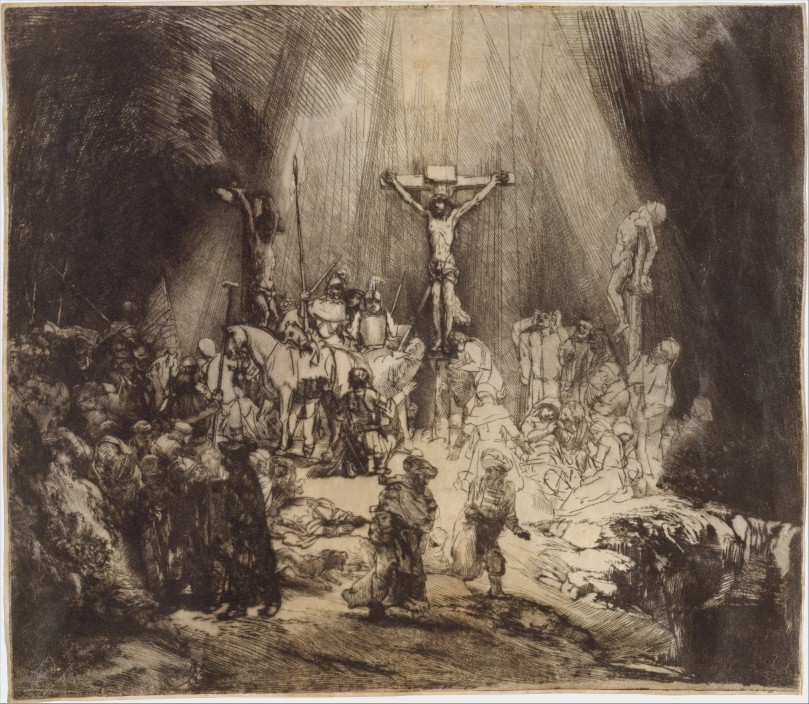
Psalm 22 is one of the most, if not the most, quoted and alluded to psalm in the New Testament. Particularly, Psalm 22 is closely connected with Jesus’ work upon the Cross, especially His exclamation of the first words of the psalm in both Mark and Matthew:
About three in the afternoon Jesus cried out in a loud voice, ‘Eli, Eli, lema sabachthani?’ (which means ‘My God, my God, why have you forsaken me?’). (Matthew 27:46)
When Jesus’ quotes that first phrase of the psalm from the Cross, He is telling His hearers something about His mission not just from that first verse, but in connection with the entire content of Psalm 22. As Bible scholar James Luther Mays says, “Citing the first words of a text was, in the tradition of the time, a way of identifying the entire passage.”[1] Jesus helps us see that Psalm 22 describes His life, ministry, and the gospel message.
At the Cross, Jesus faced humanity’s distance from God, something we have already heard in Jesus’ cry of dereliction, quoting Psalm 22:1, as recorded in both Mark 15:34; Matthew 27:46.
At the Cross, Jesus faced opponents, both human & demonic. [2] When Psalm 22:7 says, “All who see me mock me; they hurl insults, shaking their heads,” Matthew writes of Jesus on the Cross, “Those who passed by hurled insults at him, shaking their heads” (Matt 27:39; cf. Mark 15:29).
When Psalm 22:15 says, “My mouth is dried up like a potsherd, and my tongue sticks to the roof of my mouth,” John writes of Jesus on the cross, “so that Scripture would be fulfilled, Jesus said, ‘I am thirsty’” (John 19:28).
When Psalm 22:18 tells us, “They divide my clothes among them and cast lots for my garment,” Luke writes, “And they divided up his clothes by casting lots” (Luke 23:34; cf. Mark 15:24; Matt 27:35; John 19:23-24).
It is not just the crucifixion that is referenced in Psalm 22, but also the resurrection, where God delivered Jesus from death and won praise from the nations.
When Psalm 22:24 says, “[God] has not hidden his face from the afflicted one but has listened to his cry for help,” the writer to the Hebrews describes Jesus’ resurrection in this way, “[Jesus] offered up prayers and petitions with fervent cries and tears to the one who could save him from death, and he was heard” (Hebrews 5:7).
When Psalm 22:27 speaks of the Messiah winning praise from the nations, “all the nations…will turn to the Lord,” Jesus tells His disciples, “you will be my witnesses in Jerusalem, and in all Judea and Samaria, and to the ends of the earth” (Acts 1:8; cf. Matthew 28:18-20).
And when Psalm 22:31 concludes with “He [God] has done it!”, we hear echoes of Jesus’ words at the end of His ordeal upon the Cross, “It is finished!” (John 19:30).
When we read Psalm 22 with our eyes fixed on Jesus, we find that this psalm originally addressing the Israelite king’s deliverance now provides deeper meaning for Jesus as the true Messiah.
In the midst of our challenges, even our suffering and opponents, Psalm 22 shows us that God is aware, God is at work, God is delivering, and God is bringing hope.
[1] James Luther Mays, Psalms (Louisville, KY: John Knox Press, 1994), 105.
[2] See other parallels: Ps 22:6 and Matt 27:29; Ps 22:16 and Mark 15:25; John 20:25.
[…] Seeing Jesus in Psalm 22: finding hope in darkness […]
[…] Jesus is foreshadowed throughout the Old Testament. In Psalms 22:1, David speaks the words “My God, My God, why have you forsaken me…” which are later uttered by Jesus on the cross, as recorded in Matthew 27:46. The entirety of David’s words in Psalms 22 find fulfillment in the gospel accounts of Jesus’ crucifixion. This connection between the Old and New Testaments is a powerful reminder of the fulfillment of prophecy. To dive deeper into this, you may consider reading: Seeing Jesus in Psalm 22: finding hope in darkness. […]